
The rotting carcasses are providing easy fodder for rodents and other predators, including feral cats and harrier hawks.
All prey on the endangered birds living along the river.
The problem has become so bad volunteer trapping work being done in Ashley-Rakahuri Regional Park to keep predators under control has become ineffective.
There are fears if animal carcasses continue to be dumped along the river, rodent numbers will become uncontrollable, which could see the population of endangered birds living there wiped out.
‘‘Putting out traps and expecting the rats to walk in is insufficient,’’ Ashley-Rakahuri Rivercare Group (ARRG) operations manager Grant Davey says.
In 2019, an entire 48-nest black-fronted tern/tarapiroe colony and more than 100 gull chicks were destroyed by rats along the river.
Since then the rodent problem has continued to worsen.
Three weeks ago, Davey found several dead sheep and the remains of a butchered cattle beast, which had recently been dumped, on the north bank of the river about a kilometre downstream from Ashley Village.
In a ditch nearby he found the remains of dead pigs and deer, which had been there for some time, and less than 100 metres downstream were the remains of a pig.
‘‘This area has been a favourite dropping area for dead animals for years,’’ he said.
Another popular dumping place is the north bank of the river, just upstream from the Cones Rd bridge.
Other ARRG trappers had also reported pig and deer remains being dumped on both sides of the river 6-7km upstream from Rangiora.
In recent years rat detector dogs have proved valuable assets in the battle to prevent the river area from being overrun with rodents.
Rat detector dog Evie, owned by Davey and his wife Val, recently proved to be invaluable along the river.
After only a few months on the job the young Welsh springer spaniel quickly surpassed the number of rats caught by trappers along the river during the same time.
‘‘Our trapping programme simply doesn't work. We need to try other things - hence the dogs,’’ Davey said.
But with so many rats now camped along the river feasting on the illegally dumped rotting carcasses, controlling rodent numbers is mission impossible for one dog, and hiring professional dog handlers with their rat detector dogs is prohibitively expensive.
Environment Canterbury rangers clean up the worst of the stinking mess the carcasses create, but it is costly and time-consuming work.
Fly-tippers caught dumping rubbish, including animal carcasses, in the park face an instant $750 fine.
However, with ECan completing 13 carcass removal jobs so far this year at the Ashley-Rakahuri Regional Park and Waimakariri River Regional Park, plus 23 removals last year and 24 in 2022, the threat of a fine seems to be an ineffective deterrent to fly-tippers.
ECan manager parks and forests Chuck Dowdell said on average over the last five years the regional council has dealt with a carcass removal job every two weeks.
‘‘Dumping carcasses in the parks is inconsiderate to park users and environmentally unacceptable. We bury carcasses where they will not have any impacts on the environment or people’s wellbeing.’’
However, with digger hire and staff time this can cost hundreds of dollars for each removal and thousands in total each year, with all costs funded from regional council rates.
‘‘We encourage the public to advise us of any flytipping they see and provide us with photos if possible,’’ he says.
This can be done by emailing the duty ranger at duty.ranger@ecan.govt.nz or phoning ECan on 03 353 9007.
The stealth with which fly tippers operate makes it difficult to catch them dumping rubbish.
However, it is hoped the installation of motion-sensitive, night capable, cameras in the region’s parks this month will help.
By Shelley Topp














